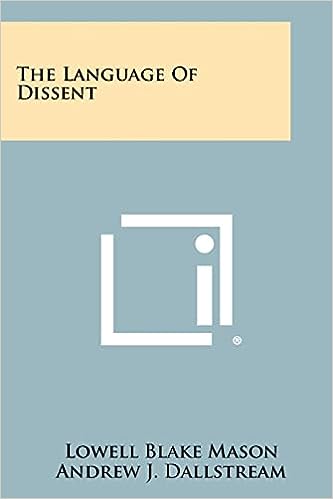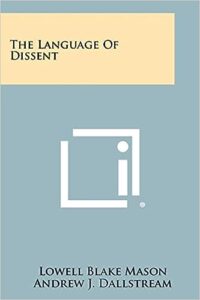

When I first started reading back issues of Ayn Rand’s Objectivist Newsletter in late 1968, I found her book reviews particularly valuable. I learned about a lot of books she recommended, got almost all of them out of the University of Winnipeg library, and read, cover to cover, all the ones I took out. It was a tremendous learning experience for me, at age 18, who had in the past read only in spurts with large gaps in between, and mainly fiction.
One book that made a particular impression on me, given that I knew virtually nothing about antitrust law, was The Language of Dissent by Lowell Mason. Mason had been a member of the Federal Trade Commission from 1945 to 1956. He was famous for his dissents from the majority decisions of the FTC. He compiled a number of them, along with explanations and context, for his book.
I read through it while researching my forthcoming article on antitrust for Defining Ideas. Although I didn’t find anything that was on point with what I wanted to write about, the book still holds up.
I did read one passage that was too long to quote in my article but that was telling. The case was Moog Industries, Inc. and Mason’s dissent was recorded on April 29, 1955. Moog was accused, under the Clayton Act, of offering different discounts to different buyers. This was not illegal per se. To be illegal, it had to lessen competition, tend to create a monopoly, or injure, destroy, or prevent competition. Mason dissented because the prosecution had not presented any evidence of injury to competition but instead had relied on the fact of disparate discounts to conclude that competition was injured. Moog’s lawyers had decided to contact customers all over the country to get their views about whether they had been injured. As Mason put it:
In the ensuing safari, every witness called positively denied he suffered any competitive injury from the challenged discounts or rebates–a position they all stoutly maintained in spite of the badgering the prosecutor gave them for ruining the Government’s case.
Mason gives a digest of the testimony in the appendix. It’s worth quoting extensively.
The first few excerpts show the prosecutor asking customers whether they were injured, with the customers saying they weren’t.
The prosecutor then shifts and starts badgering one witness:
Q: Do you know whether you suffered or not?
A: No, I didn’t suffer.
COUNSEL FOR PROSECUTION: Just a minute. We aren’t so interested in getting your answer you are making as we are to find out whether or not you have the knowledge, yes or no, whether you know, and at that time I would like to make my objection.
THE WITNESS: You want to know what, now? What is your question?
COUNSEL FOR PROSECUTION: I think Mr. Butterfield has a question pending.
TRIAL EXAMINER: Mr Witness, the question is directed to your knowledge as to whether or not you know, not whether or not you did or did not, but whether or not you know whether you did or not. That calls for a yes or no answer.
THE WITNESS: Whether I know I was injured, that is the question he asked me, was I injured.
TRIAL EXAMINER: Do you know whether or not you were injured? You know or you don’t know. He will ask you a further question on that.
THE WITNESS: My answer still was no.
COUNSEL FOR PROSECUTION: I think the witness misunderstands the question.
THE WITNESS: You asked me if I was injured.
COUNSEL FOR DEFENDANT: I ask if you know whether or not you were injured.
THE WITNESS: Do I know whether or not I was injured?
Q: Yes.
A: The answer is I don’t think I was injured. I don’t see how I could be injured. I would say, whether I know whether I was injured or not?
Q: Yes, do you know?
A: I don’t know as far as either way. I am not injured in any way. I mean, the question was asked, am I injured. We have, all the fellows are competitors.
Q: Who in your organization would know better than you whether you were injured or not?
A: Whether I was injured, in what way are you asking? Your question is whether or not I was injured?
Q: That is right.
A: No, I am not injured.
COUNSEL FOR PROSECUTION: I still move that answer be stricken and we have a yes or no answer to the question.
TRIAL EXAMINER: We will let the answer stand.
Clearly, the prosecutor thinks there’s a big difference between the question “Do you know whether you were injured?” and “Were you injured?” There is a difference but if the witness answers that he wasn’t injured he is saying that he knows he wasn’t injured.

READER COMMENTS
Gene
Sep 11 2023 at 12:45pm
Sounds more like “The Language of Kafka” to me.
nobody.really
Sep 11 2023 at 2:24pm
Does this strike anyone else as an exercise in semantics/epistemology?
The issue presented is whether a person can experience an injury without knowing it. If Jo attests that I have not injured her because she lacks knowledge that I have picked her pocket and put poison in her drink, does that make her claim true? If you choose to define “suffer an injury” to include the concept of awareness, then that makes sense. Otherwise, all we’re demonstrating is Jo’s IGNORAGE of her injury.
Imagine we asked corn farmer Jones whether he thought he was in competition with corn farmer Brown. Jones responds, “Of course not! We’re the best of friends. We do everything together. We share equipment; we help each other plant and harvest. The idea that we’re in competition is hogwash!” Would this testimony lead David Henderson to conclude that the two farmers were NOT in competition with each other–or merely that Jones is unaware of the competition?
Now, it may also be true that Moog’s customers did, in fact, suffer no injury from Moog’s conduct. But this testimony alone does not demonstrate the truth of this conclusion one way or the other.
Jon Murphy
Sep 11 2023 at 3:53pm
Your example relies on Jo being unaware of your actions. That is not the case here.
steve
Sep 11 2023 at 7:30pm
Just lawyers being lawyers. If he had asked “would you be the person able to determine if your company had been injured” that would be OK but this sounds more like hectoring or trying lead the witness.
Larger discounts for larger and regular customers is a norm, if you do offer discounts. I would think your behavior would have to be pretty egregious to do that in a way to stifle or destroy competition.
Steve
James Anderson Merritt
Sep 13 2023 at 5:16am
The prosecutor/witness exchange sounds like nothing so much as an Abbott and Costello routine. I can also imagine Lenny Bruce or George Carlin delivering versions of it. Finally, the delivery cadence in my mind’s ear matches up pretty well with some of the dialogs I remember from “Atlas Shrugged,” so now I have a glimmer of understanding about Rand’s influences. Thanks for posting this.
Comments are closed.